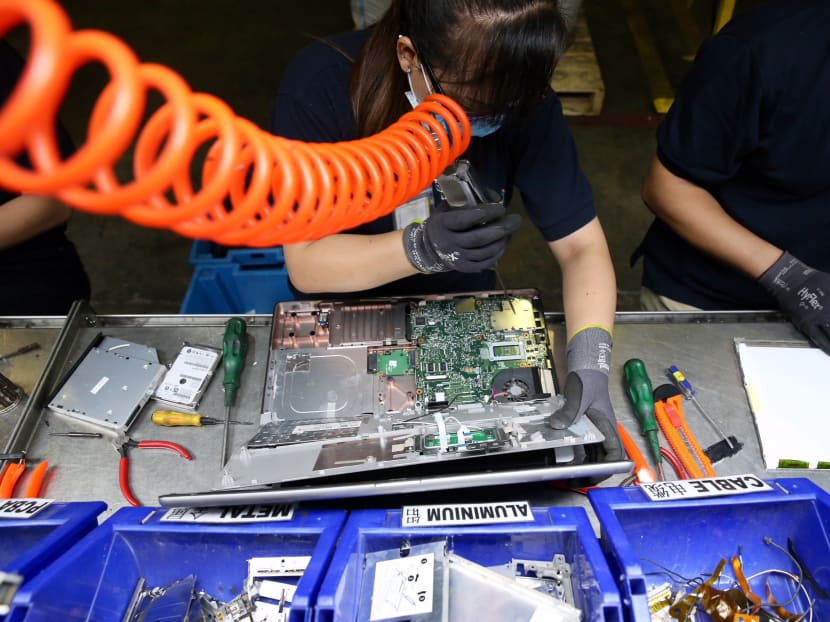Singapore looking at laws for producers to take back e-waste from customers
SINGAPORE — To curb the electronic waste (e-waste) problem here, the authorities are considering regulations for manufacturers to collect their products that customers do not want anymore.

A common feature in places with established systems to manage e-waste is the assignment of responsibilities to key players in the value chain, said the National Environment Agency. Photo: Koh Mui Fong/TODAY
SINGAPORE — To curb the electronic waste (e-waste) problem here, the authorities are considering regulations for manufacturers to collect their products that customers do not want anymore.
The National Environment Agency (NEA) is looking at best practices in other countries to develop a more comprehensive e-waste management system for Singapore.
Only 6 per cent of an estimated 30,000 tonnes e-waste – such as washing machines and television sets – thrown out by households here goes into a recycling bin, the agency’s e-waste study found. The rest is passed to a deliveryman, thrown away, donated or traded in. The average person here generates 11kg of e-waste per year.
In Germany and Sweden, large retailers are required to provide e-waste collection points in their stores and offer free one-for-one take-back services for larger products when customers make a new purchase.
In New York, electronics manufacturers fund programmes where consumers can mail small e-waste to recyclers.
A common feature in places with established systems to manage e-waste is the assignment of responsibilities to key players in the value chain, said the NEA. This is called the Extended Producer Responsibility approach, where producers ensure their products are properly recycled at the end of life.
Laws may require producers to fulfil e-waste collection targets and channel the collected e-waste to formal recyclers, for instance.
Germany, Sweden, Taiwan and India already have such legislation while countries in the region, such as Thailand and Malaysia, are considering such regulations.
Most of Singapore’s efforts have centred on raising public awareness and encouraging participation in voluntary recycling programmes, such as Singtel and SingPost’s ReCYCLE initiative launched in June last year that allows consumers to drop off unwanted electronics at Singtel and SingPost outlets, or mail them in for free.
But the amount of e-waste collected through the programmes are “only a fraction” of the total generated, said the NEA.
Other stakeholders also have to play an active role. In the European Union countries for instance, recyclers have to meet recycling targets and submit information to the regulators on their e-waste flows, among other things.
The Ministry of the Environment and Water Resources and NEA will consult the industry. They will also seek public views via a consultation session next month.
Singapore’s largest e-waste recycler TES-AMM’s group chief operating officer, Mr Gary Steele, said it would welcome legislation requiring producers to ensure proper recycling of their products at the end of life. This would make it harder for informal collectors – such as scrap traders and rag-and-bone men – to have access to e-waste.
More consumers would then know they are able to channel their e-waste back to the producers, he added.
About 3,000 tonnes of an estimated 60,000 tonnes of e-waste generated in Singapore go through TES-AMM’s recycling facility.
Ms Lynn Loh, tech giant HP’s head of sustainability of Asia Pacific and Japan, said regulations would be a “positive development” that could help generate the volume and scale needed to make e-waste recycling cost-effective.
“Today, without a piece of legislation, there is no drive on (the part of many) parties… People like us, we can finance the recycling, we make things easier to recycle,” she said.






